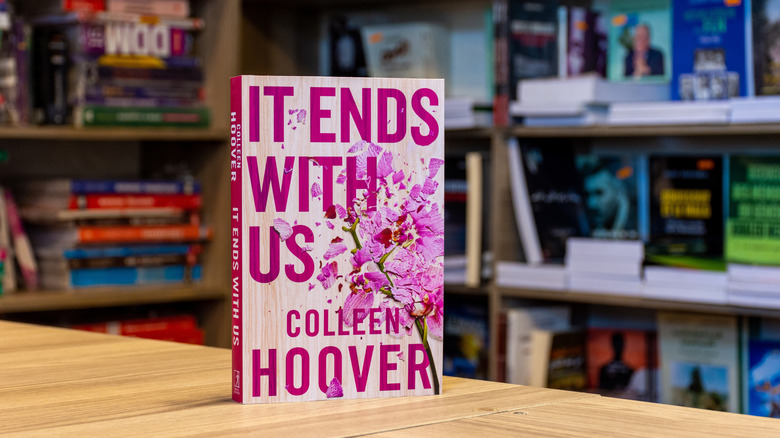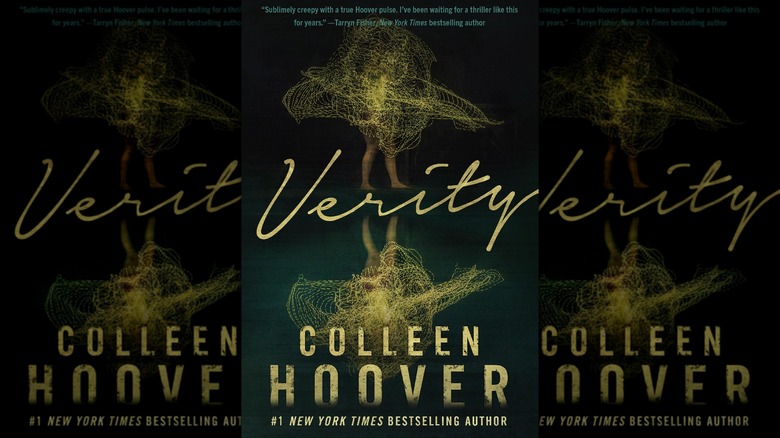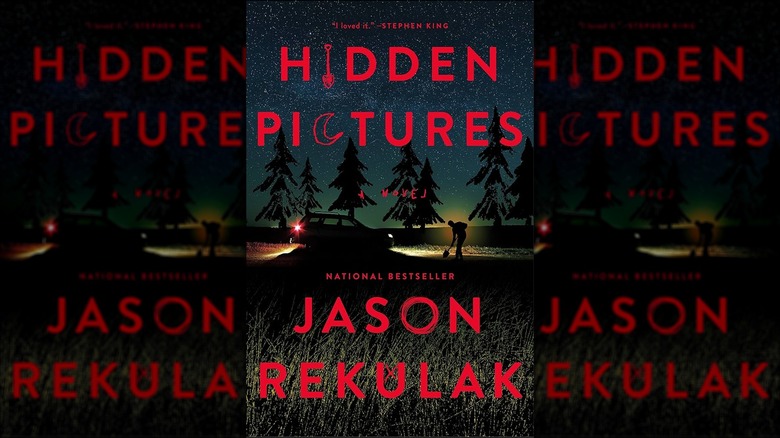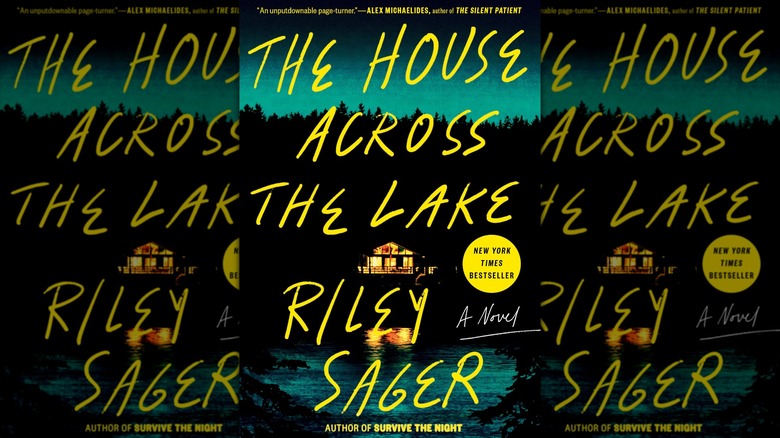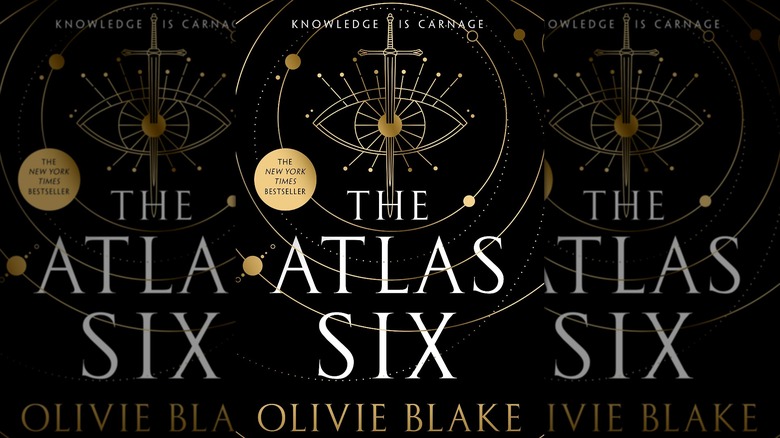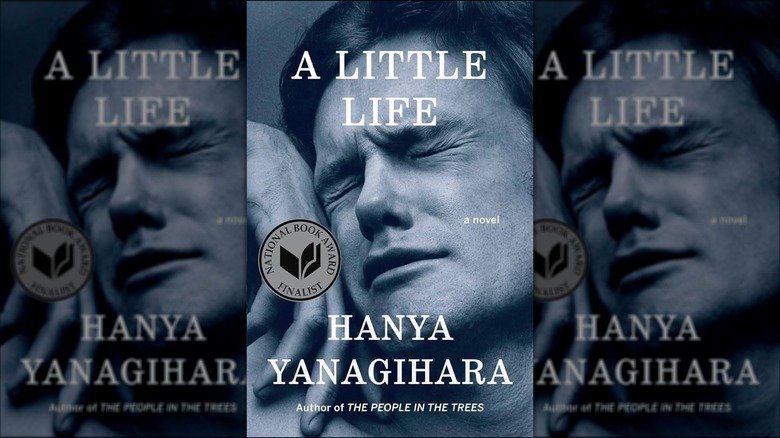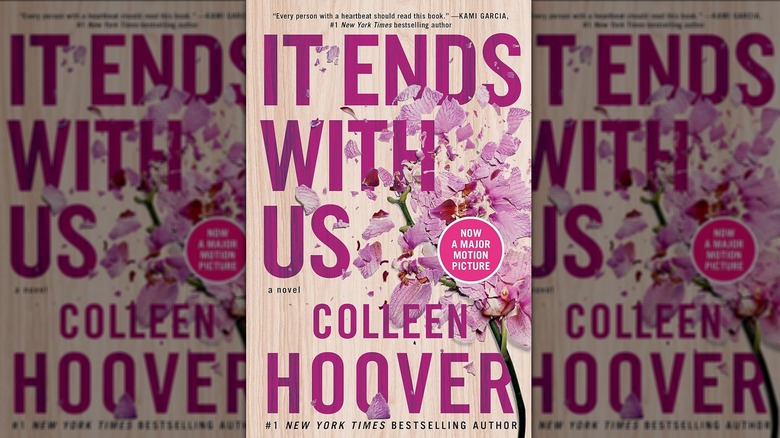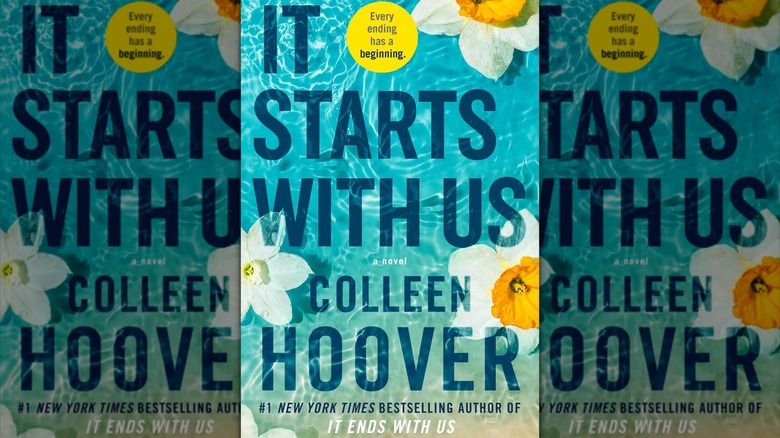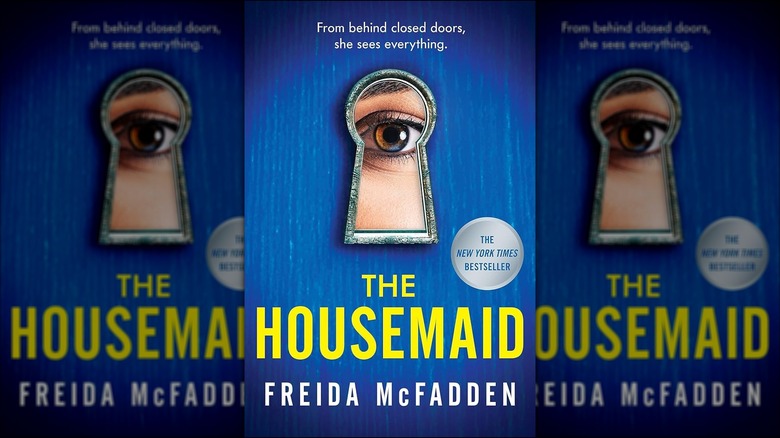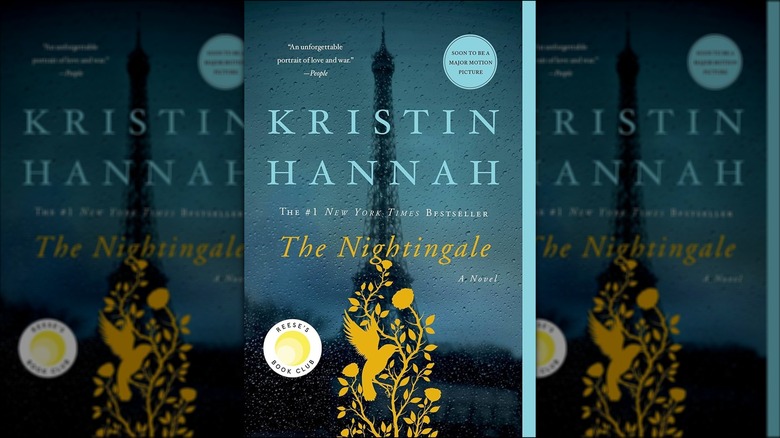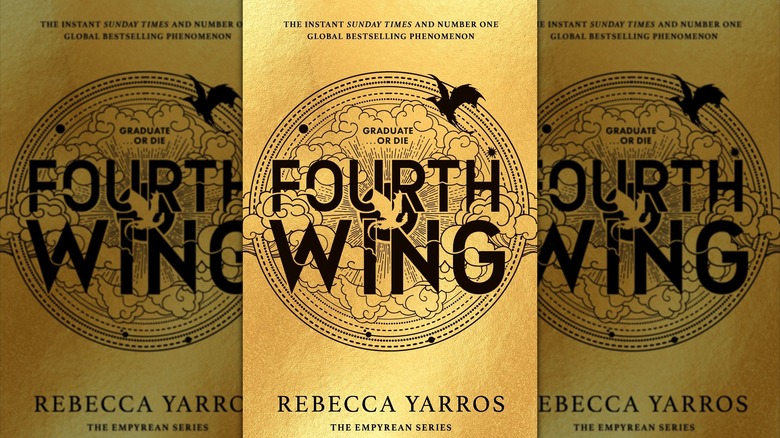BookTok Books That Don't Live Up To The Hype
Whether you actively post or just sort of lurk in the background, if you're on TikTok, you probably know about the specific corner of the social media app colloquially known as "BookTok." Various creators exclusively talk all things books on the platform, whether they're discussing the best thrillers to get you out of a reading slump or doing a deep dive on a buzzy new release. That's why it shouldn't be a huge surprise that, sometimes, books without a huge following blow up on BookTok and become sensations; Colleen Hoover, for example, is an author whose body of work has massively benefitted from word of mouth on BookTok.
Not every BookTok find is legit, though. Allow me to be clear: I read a lot. (I set my reading goal for 150 books in 2024, and I cleared that in September.) I'm a big-time BookTok lurker, and I'll admit that, especially when it comes to twisted, creepy thrillers, I've gotten some pretty excellent recommendations from TikTok creators. This is to say that BookTok can absolutely be a great resource to find your next read, but honestly, some of the biggest BookTok picks are totally overrated. Here are the most overrated BookTok picks, controversial as they may be.
Verity by Colleen Hoover
I'm gonna ruffle a lot of feathers with this one, but I don't care. Reading "Verity," Colleen Hoover's thriller about a writer who can no longer put pen to paper, was a deeply unpleasant experience. This won't be the last time Hoover shows up on this list, so I should also say I genuinely don't care for her as a writer, but objectively, "Verity" is a mess, and there are so many better thrillers out there in the world (and, frankly, on BookTok).
For the uninitiated, "Verity" shows off Hoover's commitment to borderline nonsensical names with its main character Lowen Ashleigh, a struggling writer who's asked to help a famous author named Verity Crawford finish her bestselling book series (Verity, who was grievously injured in an accident years before the narrative takes place, can't do it herself). Jeremy, Verity's husband, is the one who makes the request, and you can probably see where this is going — in that Jeremy and Lowen strike up a romantic relationship and Lowen suspects that Verity's catatonic state might not be entirely real. "Verity" is a dumb, overhyped book, and you should read it at your own risk ... especially because one of its pivotal scenes takes place, as Hoover reminds us three times on one page, while a character is washing a raw chicken, which is an image you will never be able to get out of your head. (Also, don't wash raw chicken.) If you're looking for an alternative that's also a thriller, I'd go with something like "None Of This Is True" by Lisa Jewell instead.
Hidden Pictures by Jason Rekulak
I really, really wanted to like "Hidden Pictures" by Jason Rekulak; it's all over BookTok and on basically every list of must-read thrillers. Unfortunately, it wasn't meant to be. If your patience for clunky, overwrought writing is higher than mine, you might be able to get through this book without feeling incredibly irritated, but I found myself unbelievably frustrated by Rekulak's prose, which spends all of its time telling instead of showing. In a creepy, suspenseful horror-thriller, this is literally the opposite of what you should be doing, and it doesn't count as "showing" to include children's drawings in the text itself (which Rekulak does).
"Hidden Pictures" opens as Mallory Quinn, fresh out of rehab, takes a nannying job with a wealthy couple named Ted and Caroline Maxwell. While residing in their luxurious house and taking care of their son Teddy, who loves to draw, Mallory makes an unsettling discovery: Teddy keeps sketching increasingly disturbing drawings that seem to point to a larger mystery afoot. Mallory is, honestly, the biggest issue with "Hidden Pictures." She's irritating, hard to like, and I'd say her dialogue is borderline unreadable, but that's a larger problem within the book. (At one point, Caroline goes into detail about the make and brand of a mattress; why Rekulak chose to include this is anyone's guess.) There are much better domestic thrillers out there. Don't pick this one; if you're looking for an unsettling book with a supernatural turn, "We Used to Live Here" by Marcus Kliewer is much, much better.
The House Across the Lake by Riley Sager
Riley Sager's books are always hit or miss, if we're all being honest with ourselves. Sure, they're compulsively readable, I'll give him that — but I don't think I'm alone in saying that I sometimes reach the end of one of Sager's books and go, "really?" This absolutely happened with "The House Across the Lake," which introduces us to Casey Fletcher, an actress with a bad reputation trying to escape the press who hides out at her family's lake house in rural Vermont. The titular house across the lake belongs to the wealthy, enviable couple Tom and Katherine Royce, and after Casey saves Katherine from drowning in the lake, they all end up involved in each others' lives ... which makes it all the more shocking when Katherine mysterious disappears.
What should be a fun, campy thriller turns into a bizarrely plotted, clunky supernatural story, making "The House Across the Lake" an unworthy investment of your time. If you're looking for a better Sager book with a better twist, "The Only One Left" is pretty solid, and even the absolutely goofy ending of "Lock Every Door" is better than — without giving too much away — a lake with ghosts in it or whatever.
The Atlas Six by Olivie Blake
Ever since "Harry Potter" came out way back at the end of the 20th century, various writers have been trying to shove that proverbial lightning back into the proverbial bottle, with decidedly mixed results — which is how we got "The Atlas Six" by Olivie Blake. The gist is this: six magicians have to compete for a spot in the Alexandrian Society, a shady secret magic society, and each of the six recruits — Libby, Nico, Reina, Tristan, Callum, Parisa — have to prove their magical powers to Atlas Blakely, who judges for the Alexandrian. Things get messy, a bunch of the six share secrets and sleep with one another, and ultimately? It's just a boring story that never goes anywhere particularly interesting.
"The Atlas Six" takes a whole lot from better books — more than "Harry Potter," it resembles Lev Grossman's "The Magicians" in that it's the "adult" version of a story set at magic school — and never reaches the heights of its contemporaries. Even though it was popular enough to be adapted into an upcoming TV show, you're better off skipping this one (and, perhaps, trying "The Magicians" in its stead).
A Little Life by Hanya Yanagihara
Do you like it when books make you feel absolutely, incurably miserable? If so, try reading "A Little Life" by Hanya Yanagihara! The book follows four men — Malcolm, JB, Jude, and Willem — from their college years well into their adulthood, and to say that Yanagihara inflicts maximum pain on her characters is a severe understatement. This is most true when it comes to Jude, the author's favorite punching bag, who suffers through basically every horror you could possibly imagine — and some that I frankly hope you can't imagine — for over 800 pages. Yes, not only is "A Little Life" an exercise in absolute drudgery and pain, but it's also one of the longest books you could possibly read.
I honestly don't even want to get into the full specifics of Jude's harrowing journey through "A Little Life" because the details are so unbelievably disturbing and upsetting that I don't want to inflict their descriptions upon anyone reading this. Suffice to say, this book is little more than torture porn — so if you want a sad yet beautiful look at friendships throughout the years, I'm begging you to read "Tomorrow and Tomorrow and Tomorrow" by Gabrielle Zevin instead.
It Ends With Us by Colleen Hoover
Where should I even begin here? My personal distaste for Colleen Hoover has been pretty firmly established on this list, but even if I liked some of her other stuff, I suspect I'd still find "It Ends With Us" to be a pretty bad book. When we first meet aspiring florist Lily Blossom Bloom (yeah, that's real), she's recovering from the death of her abusive father and meets Ryle Kincaid, a character whose name bravely asks the world, "what if your name was Kyle, but with an 'R'?" Ryle seems perfect — in that he's a wealthy neurosurgeon who is absolutely obsessed with Lily — but things take a tragic turn when it turns out that Ryle's temper escalates to straight-up abuse, forcing Lily to reckon with the fact that she's repeating familial patterns. Also, another character is named Allysa, and half the book is told through fan letters to Ellen DeGeneres, and both of these things, to me, are stupid.
I absolutely understand that there's a need for stories that talk about abuse, particularly ones about relationships that seem perfect at first until one partner's facade cracks and they reveal abusive behavior. A phenomenal example of this — which is ostensibly written for a young adult audience but which reads like contemporary fiction — is "Dreamland" by Sarah Dessen. "It Ends With Us" wants to say a whole lot, but ends up saying very little about anything ... and Hoover's prose is as bad as ever here. (One line in this book, for academic purposes: "When he was wiping that cow sh** on me, it was quite possibly the most turned-on I have ever been." The context of this line does not improve anything, but it is included in one of those DeGeneres fan letters.)
It Starts With Us by Colleen Hoover
The cool and fun thing about hating "It Ends With Us" is that I'm apparently in the minority, because it got a sequel. "It Starts With Us" doesn't exactly improve on its source material, though. In this one, the good news is that Lily and Ryle are not together anymore — which is a huge relief considering that they have a daughter together — and Lily is pursuing a real relationship with her childhood love, Atlas. Naturally, Ryle isn't happy about this and spends the entire book stomping all over Lily's (sensible and much-needed) boundaries and trying to flex in front of Lily's new boyfriend, all while Atlas — who gets point-of-view chapters alongside Lily — tries to corral his younger brother and protect him from their abusive mother.
"It Starts With Us" suffers from the same problem as any other Colleen Hoover book — in that it's written by Colleen Hoover — and this one also commits the crime of just being boring. Books can either be bad but readable in a way that makes you want to see how they end (you know, out of morbid curiosity), but they cannot be bad and boring. Straight to book jail with you, Colleen. (If you want to read literally anything else — perhaps a different, better story about a complex family dynamic — "Everything I Never Told You" by Celeste Ng is a great choice.)
The Housemaid by Freida McFadden
I don't feel great about including "The Housemaid" by Freida McFadden on this list, largely because I read it and had a decent time. McFadden, for all of her faults — which I'll get to in a second — knows how to craft a captivating narrative, and I'll freely admit that her thrillers are solidly plotted. The problem with McFadden's work, including "The Housemaid," is that her prose and dialogue are so frustrating. Before I really expand on this, here's what you need to know about "The Housemaid." Millie Calloway has a checkered past but needs a job, so when Nina and Andrew Winchester hire her to work as a housekeeper and babysitter for their daughter, she's thrilled. When Nina becomes extraordinarily demanding, Millie wonders if she's cut out for this job ... until she learns something about Nina and Andrew's relationship that changes everything.
"The Housemaid" is a fine thriller, but the point I'm making is that there are much better thrillers out there, and BookTok is hyping this one up way too much. Try "Behind Closed Doors" by B.A. Paris, "Local Woman Missing" by Mary Kubica, "The Girl Before You" by Nicola Rayner, or, hell, read "Gone Girl" by Gillian Flynn if you haven't. "The Housemaid" is twisted fun, but it doesn't live up to the hype at all.
The Nightingale by Kristin Hannah
I'm not going to make any friends with this take, but here goes: "The Nightingale" by Kristin Hannah is overrated! It's not bad, per se; Hannah is a capable enough writer, but her writing is just clunky enough to be a distraction. Set in France during World War II, "The Nightingale" tells the story of sisters Vianne and Isabel, who reside in the French capital while it's under German rule; Vianne ends up subjected to horrible mistreatment after she's forced to house enemy soldiers, and Isabelle joins the resistance and earns the nickname "the Nightingale" as she's hunted by the S.S. in Paris for working to destroy the regime.
Again, I am not saying this book is bad, and it's an important snapshot of what life might have been like during the devastating occupation in Europe during the second world war. It also just feels like the book wants to be "All the Light We Cannot See" by Anthony Doerr, so consider reading that instead; if you're looking for a different (and, in my opinion, better) book by Hannah, "The Women" is a strong effort from the popular author.
Fourth Wing by Rebecca Yarros
We've seen "Fourth Wing" before. Dragons are a staple of the fantasy genre, there's a definite "Hunger Games" vibe to the whole thing, and the whole "chosen one" narrative is giving everything from "Divergent" to "Harry Potter." Rebecca Yarros' hit fantasy novel focuses on the journey of Violet Sorrengail, a 20 year old girl who hopes to join a "quadrant" meant for scribes where she'll simply get to read and study all day. (Sounds great, actually.) Unfortunately for her, Violet's mother demands that she join the dragon riders instead, forcing Violet into an adventurous life for which she's largely unprepared.
If the "brave" and "studious" "quadrants" thing sounds familiar to you, that's probably because it feels lifted directly from the "Divergent" series, which in turn basically stole it from the Sorting Hat in "Harry Potter." "Fourth Wing" feels like a Frankenstein's monster book, cobbled together from some more interesting stories that came before it; unfortunately, I think you can go ahead and take this one off your TBR list. Instead, try Sarah J. Maas' highly original fantasy series "A Court of Thorns and Roses."
